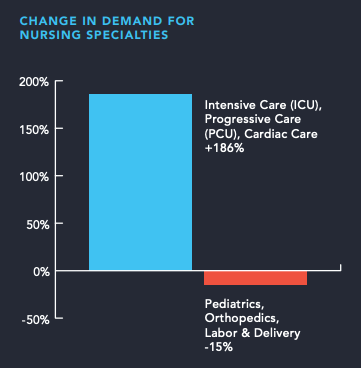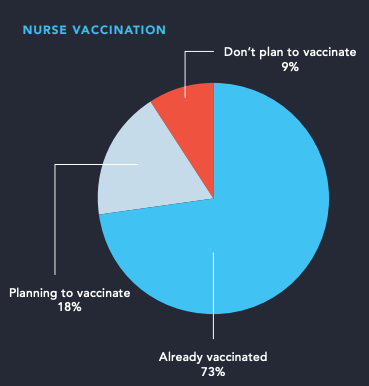
Nurses have carried a heavy burden since the COVID-19 pandemic hit the U.S. in March 2020. A year later, we wanted to understand the full scope of the pandemic’s impact on American nurses: what that burden has felt like, the impact of the pandemic on nurses’ physical and mental well-being, and what kind of career choices they made during this prolonged emergency.
Get job matches in your area + answers to all your nursing career questions

To learn more, we analyzed our own proprietary hiring data and surveyed nurses nationwide in February of 2021. The perception that nurses struggled professionally and personally during the pandemic was a reality. While bright spots stand out – including compensation – it’s clear there’s more to be done to support our critical healthcare workers.
High turnover was driven by state surges, attractive salaries
The pandemic created a flurry of movement in the nursing field. 80% of Chief Nursing Officers and Chief Human Resource Officers report an increase in permanent nurse turnover during the pandemic. The average was a 7% increase from health systems’ standard turnover, and was driven by nurses choosing early retirement, joining travel agencies, or resigning due to increased fatigue and burnout.
In the states hit hardest by the pandemic, nurses took steps to relocate or find new jobs when the pandemic peaked. For example in New York, there was a 400% increase in New York-based nurses looking for new jobs on Incredible Health in March and April of 2020 (during the state’s surge). Over 30% of those New York nurses indicated they wanted to leave the state.
[ Read: A Complete Nursing Resume Guide With Templates ]
Finances were also a major factor in turnover. A full third of nurses indicated they’d experienced personal or family financial hardship in the past year due to the pandemic. As a result, nurses joining Incredible Health in 2020 were 26% more likely to consider a job change to earn a higher salary than those who joined in the months leading up to the pandemic.
Nurse salaries and signing bonuses have gone up during the pandemic
The good news for nurses seeking higher pay: they were likely to get it. The urgent need for healthcare workers combined with a national nursing shortage resulted in higher salaries and bonuses.
The average annual salary for permanent, experienced nurses on Incredible Health’s platform increased from $112,000 before the pandemic to $122,000 by the end of 2020. In California, the average nurse salary on Incredible Health increased from $110,000 to $132,000 over the same period.
[ Read: The Highest-Paying States for Nurses ]
Signing bonuses also increased. Nationwide, pre-pandemic signing bonuses averaged $8,200 for specialized, experienced nurses. During the pandemic, signing bonuses increased 12% to an average of $9,190.
Certain specialties surged in demand while others dropped

Unsurprisingly, demand was highest for nurses whose specialties put them on the front lines caring for COVID-19 patients. Demand for Intensive Care (ICU), Progressive Care (PCU), Cardiac Care, and Emergency nurses grew by 186% in 2020 compared to a pre-pandemic period.
Other specialties did not see such an increase. In fact, there was a 15% drop in demand for nurses in Pediatrics, Orthopedics, Labor and Delivery, and Oncology departments. Patients often delayed elective or low-urgency procedures in these areas during COVID-19 surges.
Despite progress, employers must do more to protect nurse health and safety
An Incredible Health study from May 2020 found that as little as 37% of nurses received appropriate personal protective equipment (PPE). Today, a far greater share, 80%, say they’re being provided adequate PPE by their facilities. Regardless, nearly a quarter, 23%, still contracted COVID-19 sometime in the last year.

Recently, a new tool to protect healthcare workers from COVID-19 has become available: the vaccine. The CDC has recommended that healthcare workers be among the first to receive the COVID-19 vaccine.
73% of nurses responded that they’d already received at least one dose. However, that leaves over a quarter of nurses unvaccinated. While vaccine shortages are certainly a factor, it’s important to note that some vaccine skepticism exists among nurses. Of those surveyed who have not yet received a vaccine dose, 33% say they don’t plan to take the vaccine at all, even when one becomes available to them.
A glaring problem: nurse mental health
The COVID-19 pandemic continues to take a significant toll on nurses’ mental health. 89% of nurses say they’re experiencing increased stress, anxiety, or depression.
[ More: Mental Health and Wellness Toolkit for Nurses ]
Meanwhile, health systems are struggling to adequately address the increased mental health needs of their nursing staff. 73% of nurses say their facility is not providing enough support to deal with the added stress of the pandemic. This problem has gotten worse as the pandemic has progressed; In May 2020, 59% of nurses felt their facility’s mental health support was insufficient.
Overwork is one contributing factor. In May 2020, 34% of nurses reported working additional shifts to help with COVID-19 patients. Consequently, in February 2021 58% of nurses reported less time with family since the pandemic began, while 44% reported less leisure time in the same period.
This shortage of personal time to decompress, especially after emotionally taxing shifts, can compound the already negative impacts to nurse mental health.
Unfortunately, a majority of nurses (73%) still don’t feel their local community appreciates their sacrifices. Without strong community support, it is easy to see why American nurses are struggling.
How employers and community members can help
The data demonstrates what we anecdotally already know: nurses have worked hard to keep their communities safe during the pandemic and have personally struggled as a result. They deserve our recognition and respect for their herculean effort.
The number one thing non-healthcare workers can do to support them is to follow the CDC’s guidelines. If you are not a healthcare worker, keeping yourself and your communities safe will lower the pressure on healthcare systems and nurses. You may also consider thanking a nurse in your life with a note, a gift, or another form of support. Finally, employers, health tech organizations, and others in the industry can work toward providing more coping resources for stress, anxiety, and burnout.
If your hospital is looking for a better way to hire nurses, click here. Incredible Health’s award winning marketplace technology can help your talent acquisition team hire permanent, experienced nurses in 20 days or less, save at least $2M per year per facility, and improve nurse retention.
You can download the visual report here.
Methodology
We analyzed data from more than 60,000 Incredible Health nurse profiles as well as over 14,000 interview requests from employers on the platform from 2019 through 2021. We also surveyed more than 500 registered nurses in the United States in February 2021.
Get job matches in your area + answers to all your nursing career questions

